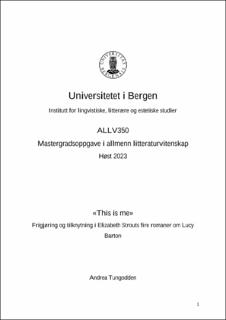"This is me": Frigjøring og tilknytning i Elizabeth Strouts fire romaner om Lucy Barton
Master thesis
Permanent lenke
https://hdl.handle.net/11250/3092547Utgivelsesdato
2023-09-04Metadata
Vis full innførselSamlinger
- Master theses [274]
Sammendrag
This thesis revolves around the theme of freedom and liberation in Elizabeth Strout’s four novels about Lucy Barton: My Name is Lucy Barton, Anything is Possible, Oh William! and Lucy by the Sea. I discuss whether the protagonist, Lucy Barton, is liberated, to what extent the liberation succeeds, and what freedom means in these novels. I begin with a reading of Lucy’s liberation from poverty and abuse, and her journey to become a writer. I show how Lucy finds herself in a tension between liberation and being tied to her past and social class, despite having forged a new life, discovered her voice, and asserted her identity through writing. I argue that the novels about Lucy Barton do not reproduce the superficial freedom that we find in The American Dream and the pursuit for individual freedom, and discuss how they depict a quest for a deeper freedom that lies in the possibility of renewal through acts of kindness and connection with other people. I suggest that acts of kindness and connection is essential in Lucy’s attempt at liberation. This also leads to an exploration of these themes in Lucy’s writing. I explore how acts of kindness, empathy and the importance of compassion occupy Lucy in her literary project and suggest that this is part of an underlying social project in Strout's authorship. I then show how freedom in the novels takes on a stylistic existence and argue that the protagonist’s struggle for freedom is evident in the style, in the literary language. I argue that it is through her writing, and ultimately in Strout’s style that Lucy can be freed. Finally, I look at the metafictional aspect of the novels and discuss what the novels say about the power of literature and how truthful literature should be recognized. I conclude that the liberation of Lucy is a non-linear process, and that it is not the protagonist’s geographical displacement or position on the social ladder that liberates her, rather it is through writing, acts of kindness and the community that she finds a deeper freedom.
